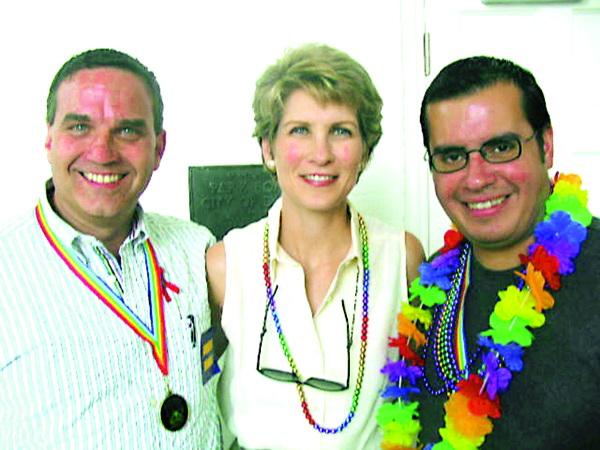HISTORIC MOMENT | Former Dallas Mayor Laura Miller poses with gay former Councilmen Ed Oakley, left, and John Loza, during previous gay Pride festivities in Lee Park. Miller was the first Dallas mayoral candidate to acknowledge the LGBT community in a speech to a mainstream audience, but bits of our history like that will be lost unless we do something now to preserve them
Dallas has one of the most vibrant LGBT communities in the U.S., but unless we do something soon, the history of this community will be lost
DAVID WEBB | The Rare Reporter
Despite its stellar, well-known rise to prominence over the past four decades, Dallas’ LGBT community might find itself hard-pressed to document its glory days in coming years.
We apparently are forgetting our history as fast as we live each new day. So many people have either died, moved away or both that the number of people who remember what happened in Dallas after the birth of the gay rights movement in June 1969 are dwindling daily.
That was illustrated recently when former city Councilman Ed Oakley, Dallas’ best-known gay politician, called the current mayoral election and the candidates’ solicitation of the LGBT vote a “watershed” moment. Actually, we had already passed that milestone in the 2002 mayoral election when all of the candidates aggressively vied for the LGBT vote.
It was in that campaign cycle that former Mayor Laura Miller took the microphone during a campaign speech before a general audience and acknowledged Dallas’ LGBT community. It was the first time for a Dallas mayoral candidate to publicly acknowledge our community’s existence before TV cameras, reporters and a mixed audience.
But now — less than a mere decade later — those enormous gains were almost lost to the collective memory of Dallas’ LGBT community.
My point is not to criticize Oakley for failing to remember what happened, but to stress the need for better documentation of our social and political history. No definitive record of the history of LGBT Dallas exists, and that makes it really difficult to know for sure what did or didn’t happen in Dallas since New York City’s Stonewall Riots kicked off the gay rights movement.
If we don’t remember where we’ve been and what we’ve done, are we prepared for where we need to go in the future?
Dallas’ LGBT community is fortunate to have a publication like the Dallas Voice that has chronicled the events of almost three decades, and the Phil Johnson Historic Archives and Research Library in the John Thomas Gay and Lesbian Community Center that contains Johnson’s personal collection of gay magazines, newspapers and other literature dating back to World War II — before most people in the community were born.
Johnson, who is in his 80s now, has written a short history of Dallas that focuses more on events that preceded the Stonewall Riots. He also has given talks about Dallas’ LGBT history that provide a fascinating glimpse into what life was like for LGBT people struggling to live their lives in an oppressive time that most of us have never experienced.
My own research of The Dallas Morning News’ archives reveals that in the 1950s the district attorney’s office aggressively pursued gay people in their homes during private parties. People were literally arrested for same-sex dancing in those days.
We can’t afford to forget that our lives today are literally blessed in comparison to what the people before us experienced. We can’t ever let politicians forget that our lives matter, and that we will never go back to the old days of subjugation.
And don’t ever forget that there are still many people around who would like to see our community dissolved and powerless. Robert Jeffress, senior pastor of the First Baptist Church of Dallas, is one of the biggest proponents of just such a movement to discredit and render us politically powerless.
That’s why it is important to document our history, to show young people in our community what we accomplished and to show our detractors that we’ve fought many battles in the past and that we will do it again if necessary.
Perhaps, it could be a collaborative effort, with many writers who lived through the times reflecting on what happened.
We’ve certainly got the talent and the resources in Dallas to document our history. The idea has been tossed around before, but apparently nothing has ever came of it. Isn’t it time that we did it?
David Webb is a veteran journalist who has covered LGBT issues for the mainstream and alternative media for three decades. E-mail him at davidwaynewebb@yahoo.com.

















I can feel the mood of Cedar Springs changing. It becoming straighter all the time. I miss the days when you knew you were in “Gay Central”, when you walked down the street. Now you can walk down Cedar Springs and hardly notice where you are. Very sad.